Critical Reflection on Interviewing a Culturally Diverse Group
VerifiedAdded on 2023/06/13
|14
|4425
|55
Essay
AI Summary
This essay provides a reflective analysis of an interview conducted with a culturally diverse group, specifically an indigenous family dealing with diabetes. Using Gibb's Reflective Cycle, the author describes a challenging interview experience where communication barriers and cultural misunderstandings hindered the process. The reflection covers the initial confidence, subsequent feelings of hopelessness and confusion, evaluation of what went wrong, and a detailed analysis of the mistakes made, such as a lack of cultural sensitivity, inappropriate direct questioning, and misinterpretation of non-verbal cues like eye contact. The essay emphasizes the importance of understanding cultural nuances, adopting appropriate communication methods, and gaining patient willingness to ensure effective interviews and care plan development. This assignment is available on Desklib, a platform offering AI-based study tools and a wealth of student-contributed content.
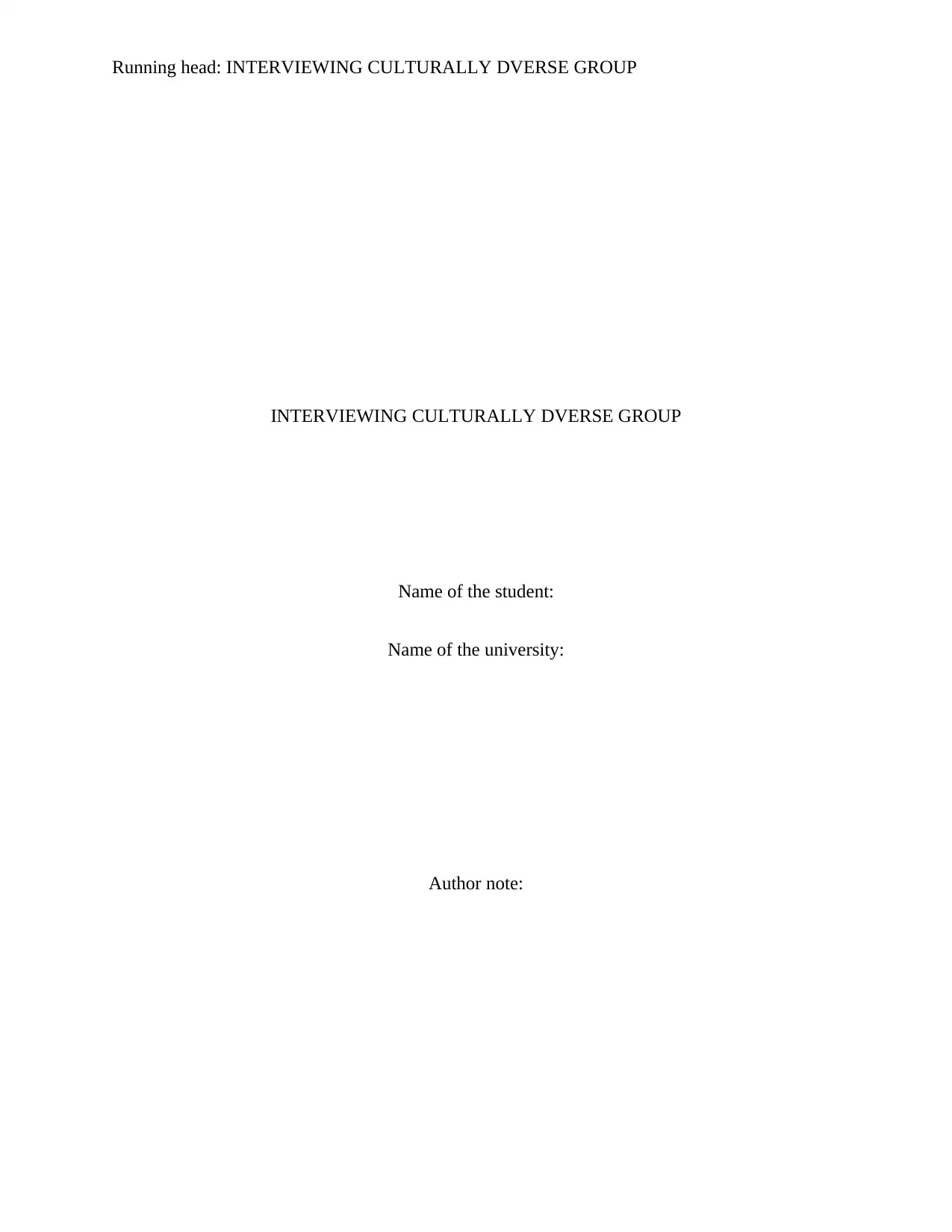
Running head: INTERVIEWING CULTURALLY DVERSE GROUP
INTERVIEWING CULTURALLY DVERSE GROUP
Name of the student:
Name of the university:
Author note:
INTERVIEWING CULTURALLY DVERSE GROUP
Name of the student:
Name of the university:
Author note:
Paraphrase This Document
Need a fresh take? Get an instant paraphrase of this document with our AI Paraphraser
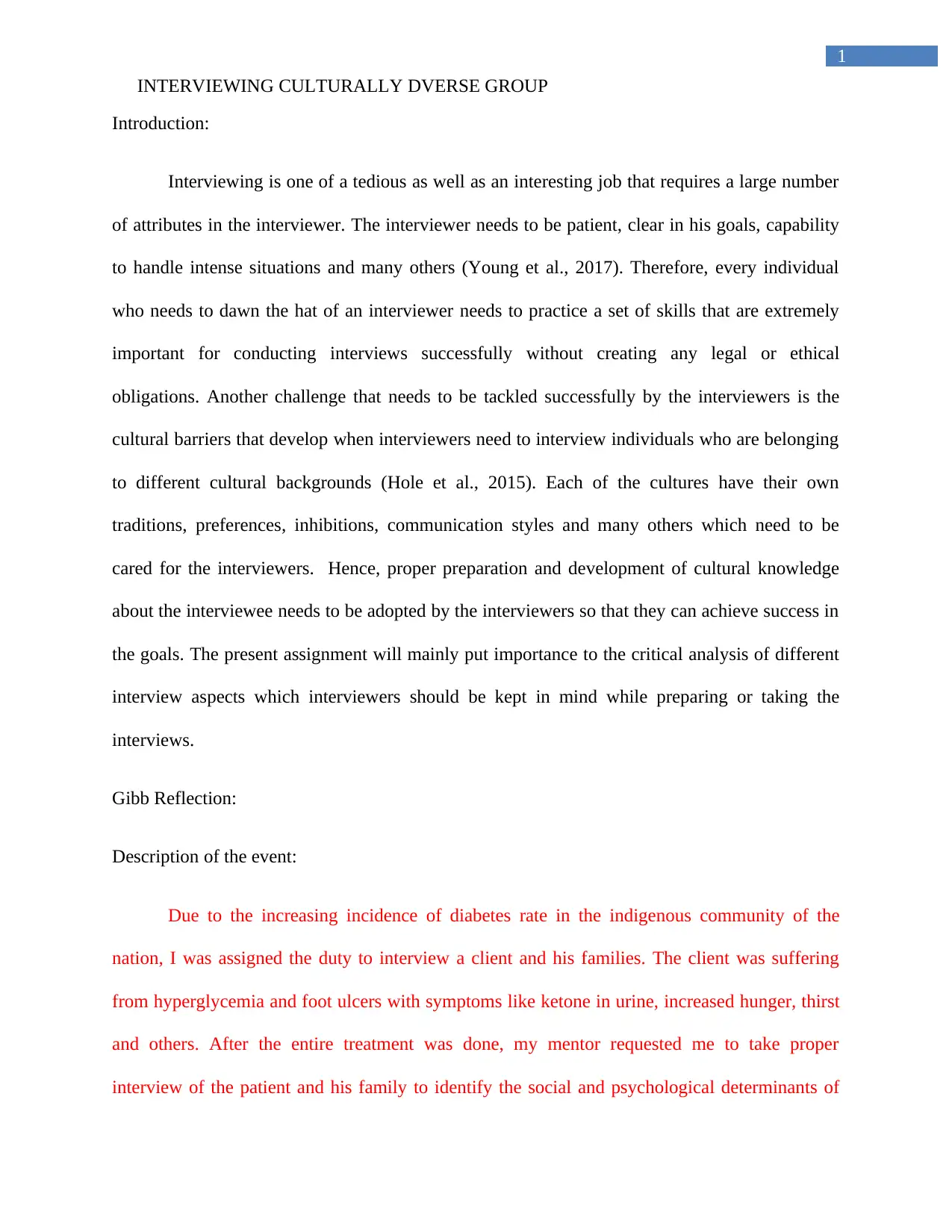
1
INTERVIEWING CULTURALLY DVERSE GROUP
Introduction:
Interviewing is one of a tedious as well as an interesting job that requires a large number
of attributes in the interviewer. The interviewer needs to be patient, clear in his goals, capability
to handle intense situations and many others (Young et al., 2017). Therefore, every individual
who needs to dawn the hat of an interviewer needs to practice a set of skills that are extremely
important for conducting interviews successfully without creating any legal or ethical
obligations. Another challenge that needs to be tackled successfully by the interviewers is the
cultural barriers that develop when interviewers need to interview individuals who are belonging
to different cultural backgrounds (Hole et al., 2015). Each of the cultures have their own
traditions, preferences, inhibitions, communication styles and many others which need to be
cared for the interviewers. Hence, proper preparation and development of cultural knowledge
about the interviewee needs to be adopted by the interviewers so that they can achieve success in
the goals. The present assignment will mainly put importance to the critical analysis of different
interview aspects which interviewers should be kept in mind while preparing or taking the
interviews.
Gibb Reflection:
Description of the event:
Due to the increasing incidence of diabetes rate in the indigenous community of the
nation, I was assigned the duty to interview a client and his families. The client was suffering
from hyperglycemia and foot ulcers with symptoms like ketone in urine, increased hunger, thirst
and others. After the entire treatment was done, my mentor requested me to take proper
interview of the patient and his family to identify the social and psychological determinants of
INTERVIEWING CULTURALLY DVERSE GROUP
Introduction:
Interviewing is one of a tedious as well as an interesting job that requires a large number
of attributes in the interviewer. The interviewer needs to be patient, clear in his goals, capability
to handle intense situations and many others (Young et al., 2017). Therefore, every individual
who needs to dawn the hat of an interviewer needs to practice a set of skills that are extremely
important for conducting interviews successfully without creating any legal or ethical
obligations. Another challenge that needs to be tackled successfully by the interviewers is the
cultural barriers that develop when interviewers need to interview individuals who are belonging
to different cultural backgrounds (Hole et al., 2015). Each of the cultures have their own
traditions, preferences, inhibitions, communication styles and many others which need to be
cared for the interviewers. Hence, proper preparation and development of cultural knowledge
about the interviewee needs to be adopted by the interviewers so that they can achieve success in
the goals. The present assignment will mainly put importance to the critical analysis of different
interview aspects which interviewers should be kept in mind while preparing or taking the
interviews.
Gibb Reflection:
Description of the event:
Due to the increasing incidence of diabetes rate in the indigenous community of the
nation, I was assigned the duty to interview a client and his families. The client was suffering
from hyperglycemia and foot ulcers with symptoms like ketone in urine, increased hunger, thirst
and others. After the entire treatment was done, my mentor requested me to take proper
interview of the patient and his family to identify the social and psychological determinants of
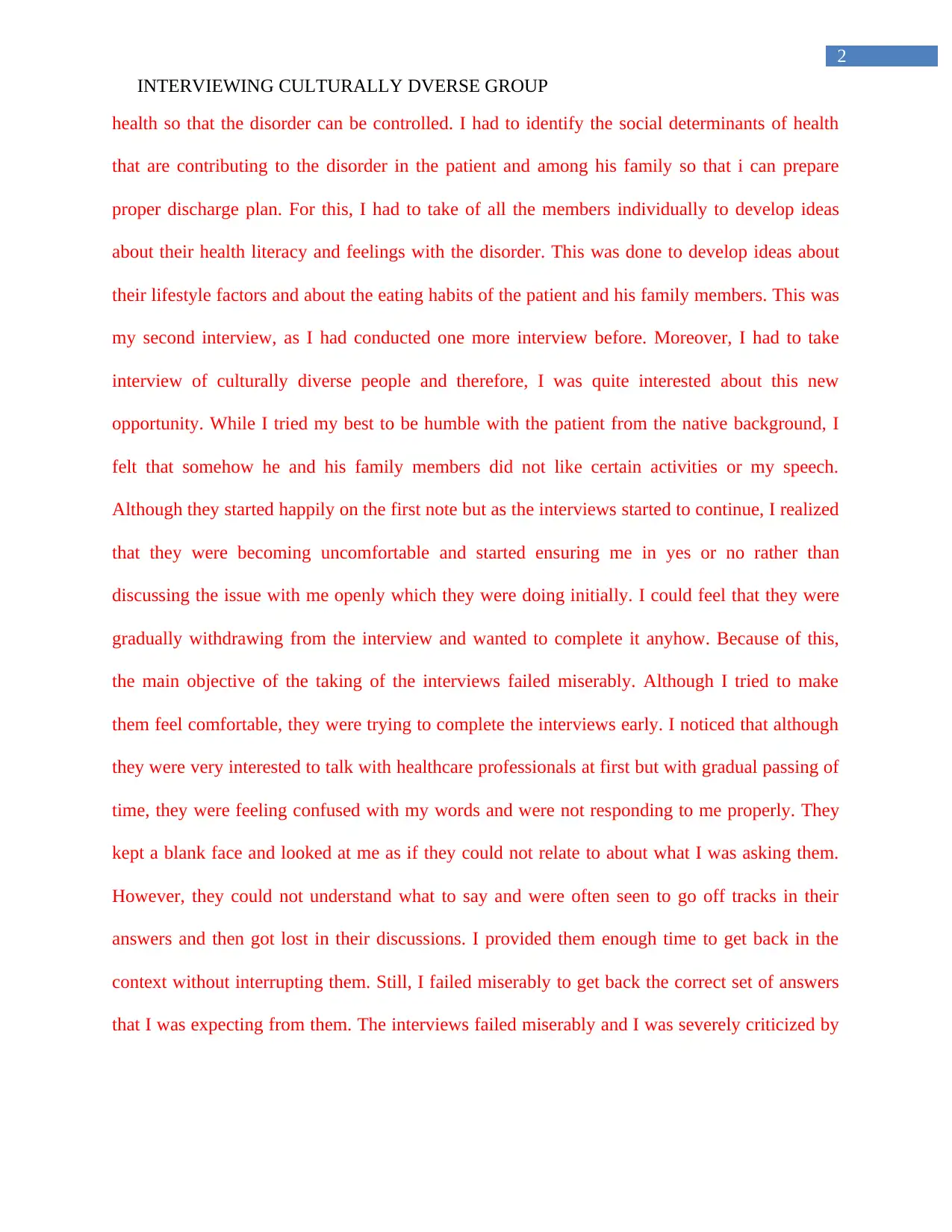
2
INTERVIEWING CULTURALLY DVERSE GROUP
health so that the disorder can be controlled. I had to identify the social determinants of health
that are contributing to the disorder in the patient and among his family so that i can prepare
proper discharge plan. For this, I had to take of all the members individually to develop ideas
about their health literacy and feelings with the disorder. This was done to develop ideas about
their lifestyle factors and about the eating habits of the patient and his family members. This was
my second interview, as I had conducted one more interview before. Moreover, I had to take
interview of culturally diverse people and therefore, I was quite interested about this new
opportunity. While I tried my best to be humble with the patient from the native background, I
felt that somehow he and his family members did not like certain activities or my speech.
Although they started happily on the first note but as the interviews started to continue, I realized
that they were becoming uncomfortable and started ensuring me in yes or no rather than
discussing the issue with me openly which they were doing initially. I could feel that they were
gradually withdrawing from the interview and wanted to complete it anyhow. Because of this,
the main objective of the taking of the interviews failed miserably. Although I tried to make
them feel comfortable, they were trying to complete the interviews early. I noticed that although
they were very interested to talk with healthcare professionals at first but with gradual passing of
time, they were feeling confused with my words and were not responding to me properly. They
kept a blank face and looked at me as if they could not relate to about what I was asking them.
However, they could not understand what to say and were often seen to go off tracks in their
answers and then got lost in their discussions. I provided them enough time to get back in the
context without interrupting them. Still, I failed miserably to get back the correct set of answers
that I was expecting from them. The interviews failed miserably and I was severely criticized by
INTERVIEWING CULTURALLY DVERSE GROUP
health so that the disorder can be controlled. I had to identify the social determinants of health
that are contributing to the disorder in the patient and among his family so that i can prepare
proper discharge plan. For this, I had to take of all the members individually to develop ideas
about their health literacy and feelings with the disorder. This was done to develop ideas about
their lifestyle factors and about the eating habits of the patient and his family members. This was
my second interview, as I had conducted one more interview before. Moreover, I had to take
interview of culturally diverse people and therefore, I was quite interested about this new
opportunity. While I tried my best to be humble with the patient from the native background, I
felt that somehow he and his family members did not like certain activities or my speech.
Although they started happily on the first note but as the interviews started to continue, I realized
that they were becoming uncomfortable and started ensuring me in yes or no rather than
discussing the issue with me openly which they were doing initially. I could feel that they were
gradually withdrawing from the interview and wanted to complete it anyhow. Because of this,
the main objective of the taking of the interviews failed miserably. Although I tried to make
them feel comfortable, they were trying to complete the interviews early. I noticed that although
they were very interested to talk with healthcare professionals at first but with gradual passing of
time, they were feeling confused with my words and were not responding to me properly. They
kept a blank face and looked at me as if they could not relate to about what I was asking them.
However, they could not understand what to say and were often seen to go off tracks in their
answers and then got lost in their discussions. I provided them enough time to get back in the
context without interrupting them. Still, I failed miserably to get back the correct set of answers
that I was expecting from them. The interviews failed miserably and I was severely criticized by
⊘ This is a preview!⊘
Do you want full access?
Subscribe today to unlock all pages.

Trusted by 1+ million students worldwide
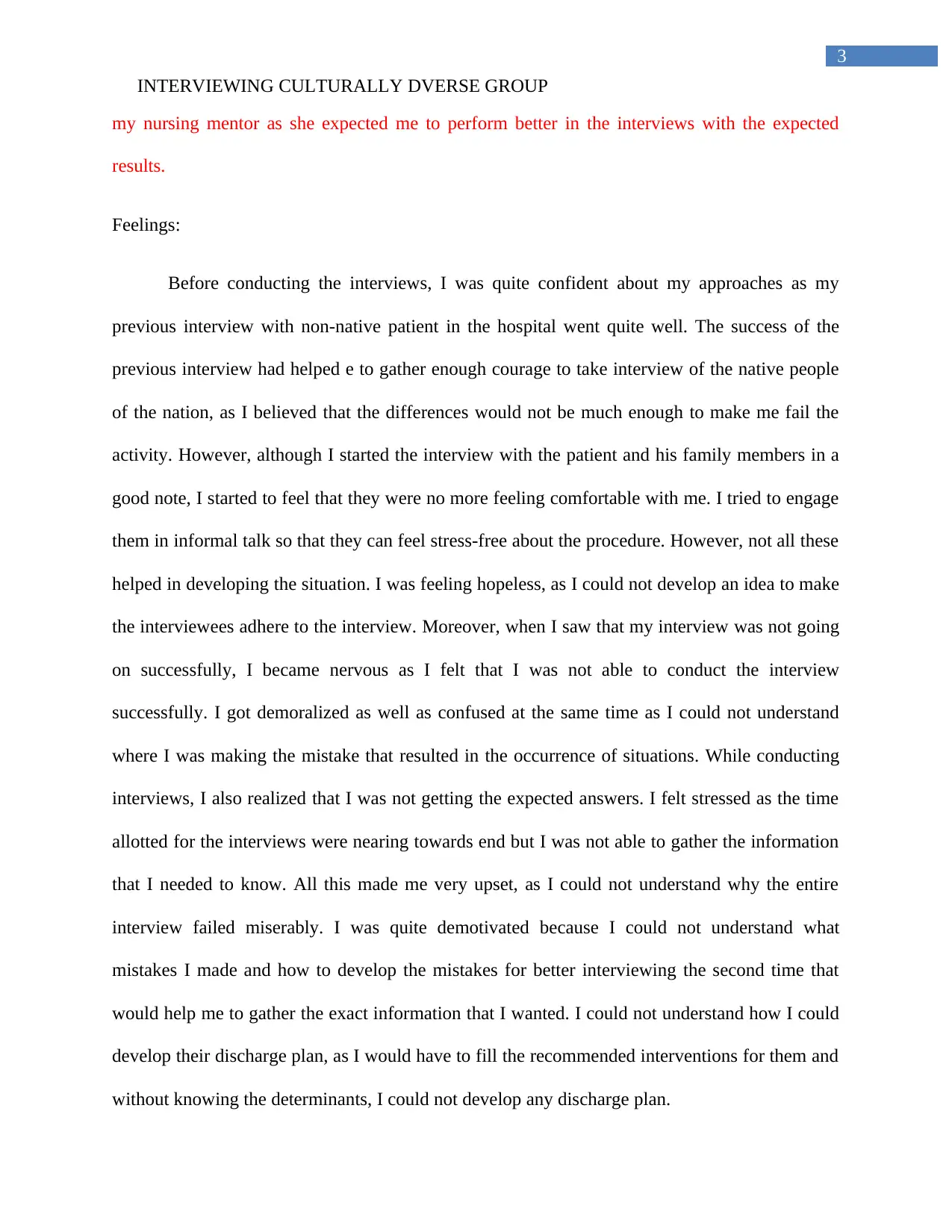
3
INTERVIEWING CULTURALLY DVERSE GROUP
my nursing mentor as she expected me to perform better in the interviews with the expected
results.
Feelings:
Before conducting the interviews, I was quite confident about my approaches as my
previous interview with non-native patient in the hospital went quite well. The success of the
previous interview had helped e to gather enough courage to take interview of the native people
of the nation, as I believed that the differences would not be much enough to make me fail the
activity. However, although I started the interview with the patient and his family members in a
good note, I started to feel that they were no more feeling comfortable with me. I tried to engage
them in informal talk so that they can feel stress-free about the procedure. However, not all these
helped in developing the situation. I was feeling hopeless, as I could not develop an idea to make
the interviewees adhere to the interview. Moreover, when I saw that my interview was not going
on successfully, I became nervous as I felt that I was not able to conduct the interview
successfully. I got demoralized as well as confused at the same time as I could not understand
where I was making the mistake that resulted in the occurrence of situations. While conducting
interviews, I also realized that I was not getting the expected answers. I felt stressed as the time
allotted for the interviews were nearing towards end but I was not able to gather the information
that I needed to know. All this made me very upset, as I could not understand why the entire
interview failed miserably. I was quite demotivated because I could not understand what
mistakes I made and how to develop the mistakes for better interviewing the second time that
would help me to gather the exact information that I wanted. I could not understand how I could
develop their discharge plan, as I would have to fill the recommended interventions for them and
without knowing the determinants, I could not develop any discharge plan.
INTERVIEWING CULTURALLY DVERSE GROUP
my nursing mentor as she expected me to perform better in the interviews with the expected
results.
Feelings:
Before conducting the interviews, I was quite confident about my approaches as my
previous interview with non-native patient in the hospital went quite well. The success of the
previous interview had helped e to gather enough courage to take interview of the native people
of the nation, as I believed that the differences would not be much enough to make me fail the
activity. However, although I started the interview with the patient and his family members in a
good note, I started to feel that they were no more feeling comfortable with me. I tried to engage
them in informal talk so that they can feel stress-free about the procedure. However, not all these
helped in developing the situation. I was feeling hopeless, as I could not develop an idea to make
the interviewees adhere to the interview. Moreover, when I saw that my interview was not going
on successfully, I became nervous as I felt that I was not able to conduct the interview
successfully. I got demoralized as well as confused at the same time as I could not understand
where I was making the mistake that resulted in the occurrence of situations. While conducting
interviews, I also realized that I was not getting the expected answers. I felt stressed as the time
allotted for the interviews were nearing towards end but I was not able to gather the information
that I needed to know. All this made me very upset, as I could not understand why the entire
interview failed miserably. I was quite demotivated because I could not understand what
mistakes I made and how to develop the mistakes for better interviewing the second time that
would help me to gather the exact information that I wanted. I could not understand how I could
develop their discharge plan, as I would have to fill the recommended interventions for them and
without knowing the determinants, I could not develop any discharge plan.
Paraphrase This Document
Need a fresh take? Get an instant paraphrase of this document with our AI Paraphraser
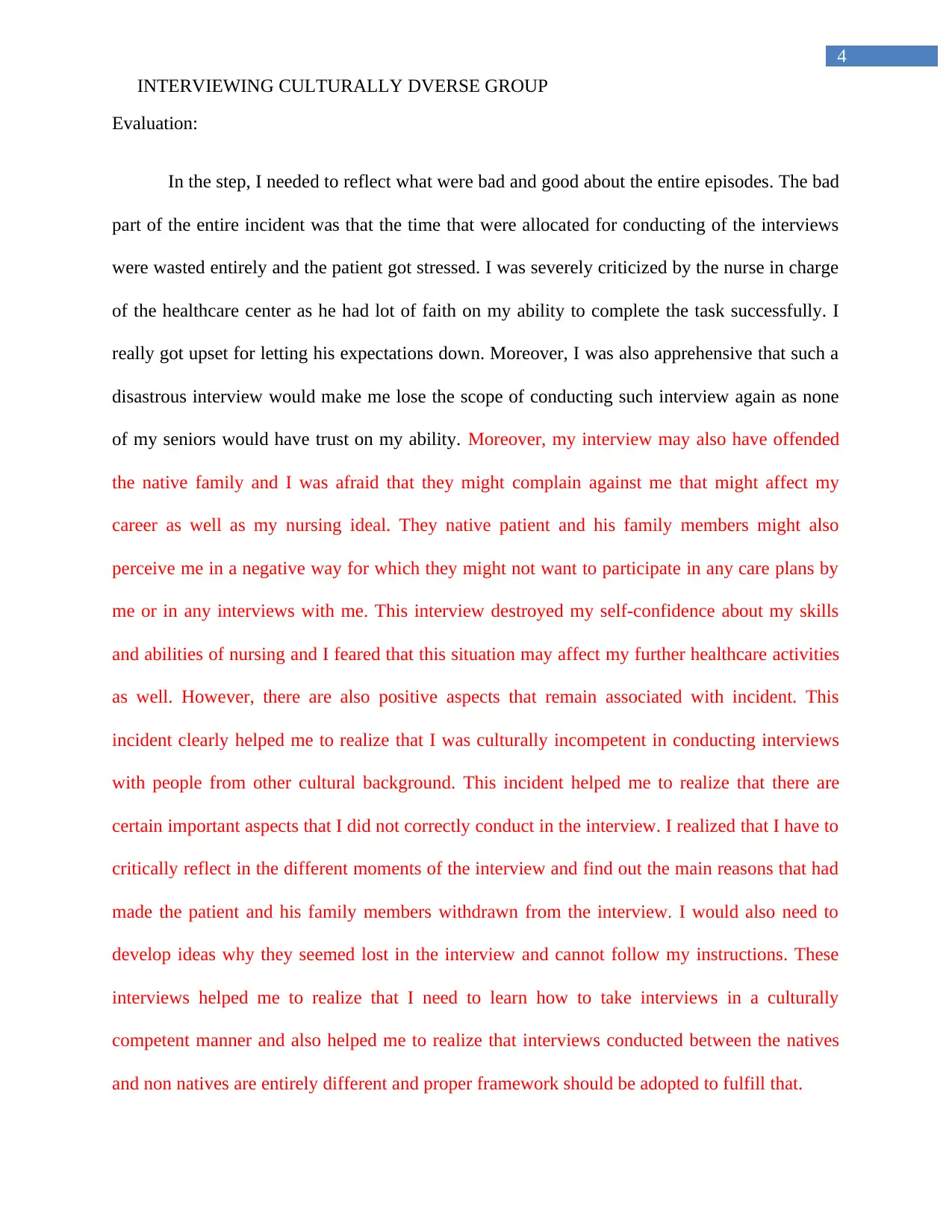
4
INTERVIEWING CULTURALLY DVERSE GROUP
Evaluation:
In the step, I needed to reflect what were bad and good about the entire episodes. The bad
part of the entire incident was that the time that were allocated for conducting of the interviews
were wasted entirely and the patient got stressed. I was severely criticized by the nurse in charge
of the healthcare center as he had lot of faith on my ability to complete the task successfully. I
really got upset for letting his expectations down. Moreover, I was also apprehensive that such a
disastrous interview would make me lose the scope of conducting such interview again as none
of my seniors would have trust on my ability. Moreover, my interview may also have offended
the native family and I was afraid that they might complain against me that might affect my
career as well as my nursing ideal. They native patient and his family members might also
perceive me in a negative way for which they might not want to participate in any care plans by
me or in any interviews with me. This interview destroyed my self-confidence about my skills
and abilities of nursing and I feared that this situation may affect my further healthcare activities
as well. However, there are also positive aspects that remain associated with incident. This
incident clearly helped me to realize that I was culturally incompetent in conducting interviews
with people from other cultural background. This incident helped me to realize that there are
certain important aspects that I did not correctly conduct in the interview. I realized that I have to
critically reflect in the different moments of the interview and find out the main reasons that had
made the patient and his family members withdrawn from the interview. I would also need to
develop ideas why they seemed lost in the interview and cannot follow my instructions. These
interviews helped me to realize that I need to learn how to take interviews in a culturally
competent manner and also helped me to realize that interviews conducted between the natives
and non natives are entirely different and proper framework should be adopted to fulfill that.
INTERVIEWING CULTURALLY DVERSE GROUP
Evaluation:
In the step, I needed to reflect what were bad and good about the entire episodes. The bad
part of the entire incident was that the time that were allocated for conducting of the interviews
were wasted entirely and the patient got stressed. I was severely criticized by the nurse in charge
of the healthcare center as he had lot of faith on my ability to complete the task successfully. I
really got upset for letting his expectations down. Moreover, I was also apprehensive that such a
disastrous interview would make me lose the scope of conducting such interview again as none
of my seniors would have trust on my ability. Moreover, my interview may also have offended
the native family and I was afraid that they might complain against me that might affect my
career as well as my nursing ideal. They native patient and his family members might also
perceive me in a negative way for which they might not want to participate in any care plans by
me or in any interviews with me. This interview destroyed my self-confidence about my skills
and abilities of nursing and I feared that this situation may affect my further healthcare activities
as well. However, there are also positive aspects that remain associated with incident. This
incident clearly helped me to realize that I was culturally incompetent in conducting interviews
with people from other cultural background. This incident helped me to realize that there are
certain important aspects that I did not correctly conduct in the interview. I realized that I have to
critically reflect in the different moments of the interview and find out the main reasons that had
made the patient and his family members withdrawn from the interview. I would also need to
develop ideas why they seemed lost in the interview and cannot follow my instructions. These
interviews helped me to realize that I need to learn how to take interviews in a culturally
competent manner and also helped me to realize that interviews conducted between the natives
and non natives are entirely different and proper framework should be adopted to fulfill that.
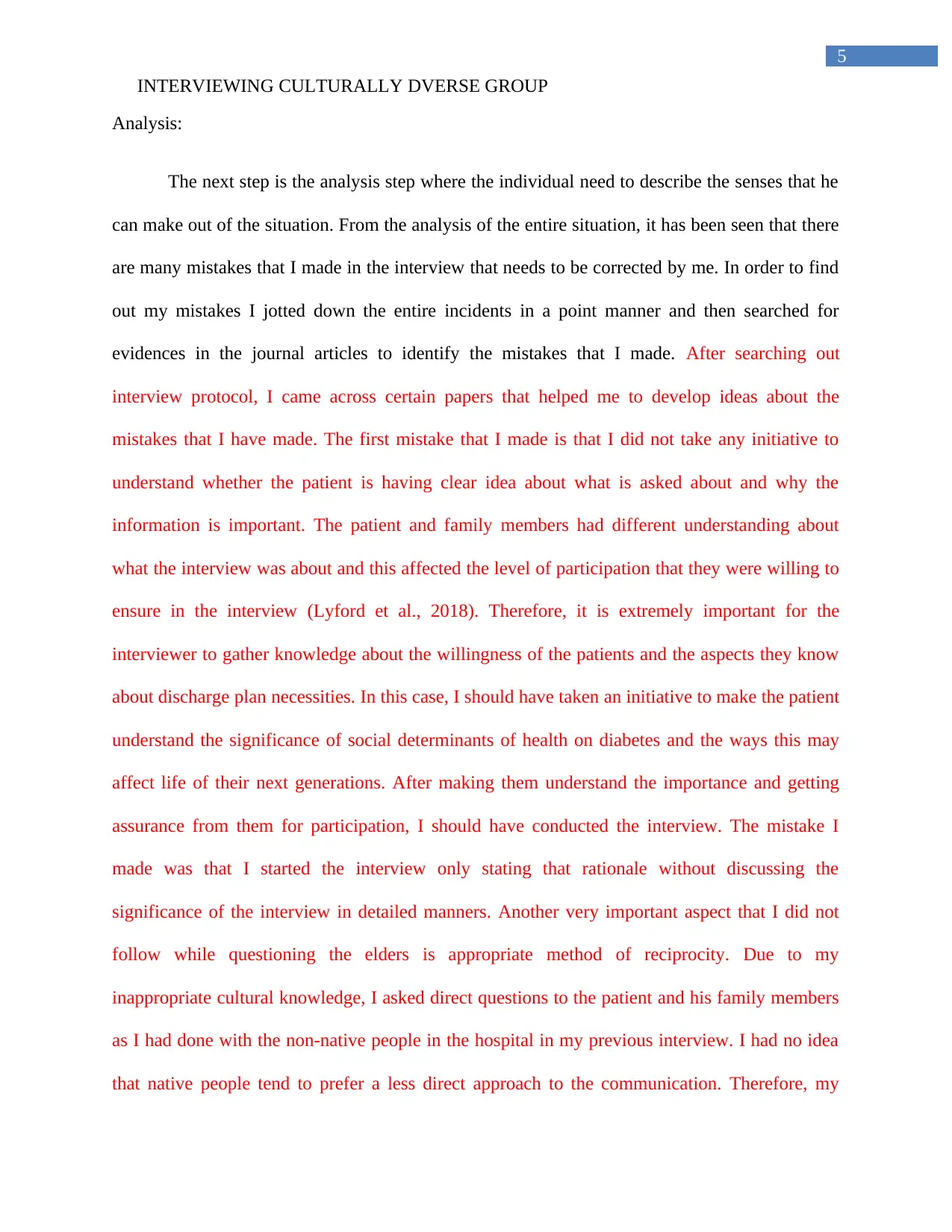
5
INTERVIEWING CULTURALLY DVERSE GROUP
Analysis:
The next step is the analysis step where the individual need to describe the senses that he
can make out of the situation. From the analysis of the entire situation, it has been seen that there
are many mistakes that I made in the interview that needs to be corrected by me. In order to find
out my mistakes I jotted down the entire incidents in a point manner and then searched for
evidences in the journal articles to identify the mistakes that I made. After searching out
interview protocol, I came across certain papers that helped me to develop ideas about the
mistakes that I have made. The first mistake that I made is that I did not take any initiative to
understand whether the patient is having clear idea about what is asked about and why the
information is important. The patient and family members had different understanding about
what the interview was about and this affected the level of participation that they were willing to
ensure in the interview (Lyford et al., 2018). Therefore, it is extremely important for the
interviewer to gather knowledge about the willingness of the patients and the aspects they know
about discharge plan necessities. In this case, I should have taken an initiative to make the patient
understand the significance of social determinants of health on diabetes and the ways this may
affect life of their next generations. After making them understand the importance and getting
assurance from them for participation, I should have conducted the interview. The mistake I
made was that I started the interview only stating that rationale without discussing the
significance of the interview in detailed manners. Another very important aspect that I did not
follow while questioning the elders is appropriate method of reciprocity. Due to my
inappropriate cultural knowledge, I asked direct questions to the patient and his family members
as I had done with the non-native people in the hospital in my previous interview. I had no idea
that native people tend to prefer a less direct approach to the communication. Therefore, my
INTERVIEWING CULTURALLY DVERSE GROUP
Analysis:
The next step is the analysis step where the individual need to describe the senses that he
can make out of the situation. From the analysis of the entire situation, it has been seen that there
are many mistakes that I made in the interview that needs to be corrected by me. In order to find
out my mistakes I jotted down the entire incidents in a point manner and then searched for
evidences in the journal articles to identify the mistakes that I made. After searching out
interview protocol, I came across certain papers that helped me to develop ideas about the
mistakes that I have made. The first mistake that I made is that I did not take any initiative to
understand whether the patient is having clear idea about what is asked about and why the
information is important. The patient and family members had different understanding about
what the interview was about and this affected the level of participation that they were willing to
ensure in the interview (Lyford et al., 2018). Therefore, it is extremely important for the
interviewer to gather knowledge about the willingness of the patients and the aspects they know
about discharge plan necessities. In this case, I should have taken an initiative to make the patient
understand the significance of social determinants of health on diabetes and the ways this may
affect life of their next generations. After making them understand the importance and getting
assurance from them for participation, I should have conducted the interview. The mistake I
made was that I started the interview only stating that rationale without discussing the
significance of the interview in detailed manners. Another very important aspect that I did not
follow while questioning the elders is appropriate method of reciprocity. Due to my
inappropriate cultural knowledge, I asked direct questions to the patient and his family members
as I had done with the non-native people in the hospital in my previous interview. I had no idea
that native people tend to prefer a less direct approach to the communication. Therefore, my
⊘ This is a preview!⊘
Do you want full access?
Subscribe today to unlock all pages.

Trusted by 1+ million students worldwide
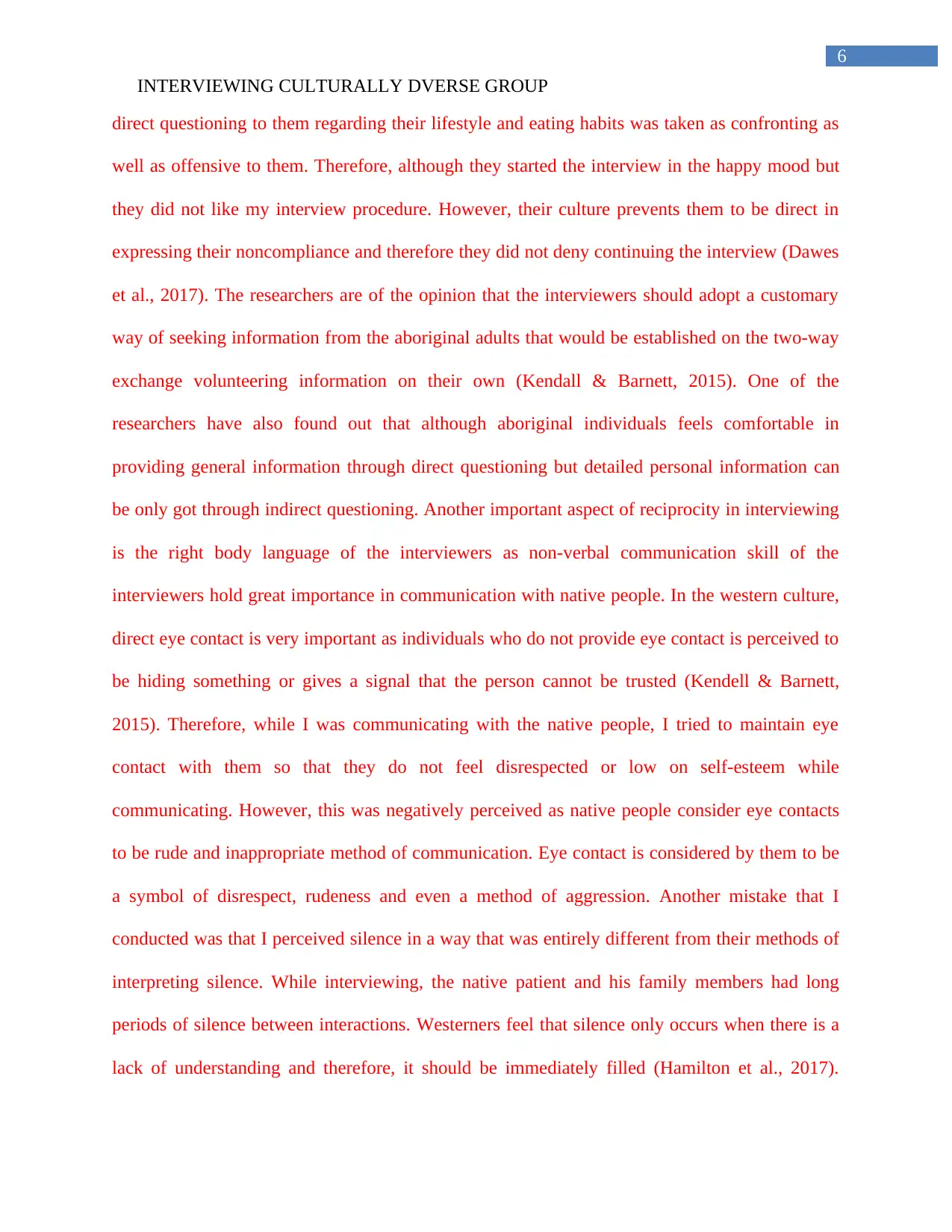
6
INTERVIEWING CULTURALLY DVERSE GROUP
direct questioning to them regarding their lifestyle and eating habits was taken as confronting as
well as offensive to them. Therefore, although they started the interview in the happy mood but
they did not like my interview procedure. However, their culture prevents them to be direct in
expressing their noncompliance and therefore they did not deny continuing the interview (Dawes
et al., 2017). The researchers are of the opinion that the interviewers should adopt a customary
way of seeking information from the aboriginal adults that would be established on the two-way
exchange volunteering information on their own (Kendall & Barnett, 2015). One of the
researchers have also found out that although aboriginal individuals feels comfortable in
providing general information through direct questioning but detailed personal information can
be only got through indirect questioning. Another important aspect of reciprocity in interviewing
is the right body language of the interviewers as non-verbal communication skill of the
interviewers hold great importance in communication with native people. In the western culture,
direct eye contact is very important as individuals who do not provide eye contact is perceived to
be hiding something or gives a signal that the person cannot be trusted (Kendell & Barnett,
2015). Therefore, while I was communicating with the native people, I tried to maintain eye
contact with them so that they do not feel disrespected or low on self-esteem while
communicating. However, this was negatively perceived as native people consider eye contacts
to be rude and inappropriate method of communication. Eye contact is considered by them to be
a symbol of disrespect, rudeness and even a method of aggression. Another mistake that I
conducted was that I perceived silence in a way that was entirely different from their methods of
interpreting silence. While interviewing, the native patient and his family members had long
periods of silence between interactions. Westerners feel that silence only occurs when there is a
lack of understanding and therefore, it should be immediately filled (Hamilton et al., 2017).
INTERVIEWING CULTURALLY DVERSE GROUP
direct questioning to them regarding their lifestyle and eating habits was taken as confronting as
well as offensive to them. Therefore, although they started the interview in the happy mood but
they did not like my interview procedure. However, their culture prevents them to be direct in
expressing their noncompliance and therefore they did not deny continuing the interview (Dawes
et al., 2017). The researchers are of the opinion that the interviewers should adopt a customary
way of seeking information from the aboriginal adults that would be established on the two-way
exchange volunteering information on their own (Kendall & Barnett, 2015). One of the
researchers have also found out that although aboriginal individuals feels comfortable in
providing general information through direct questioning but detailed personal information can
be only got through indirect questioning. Another important aspect of reciprocity in interviewing
is the right body language of the interviewers as non-verbal communication skill of the
interviewers hold great importance in communication with native people. In the western culture,
direct eye contact is very important as individuals who do not provide eye contact is perceived to
be hiding something or gives a signal that the person cannot be trusted (Kendell & Barnett,
2015). Therefore, while I was communicating with the native people, I tried to maintain eye
contact with them so that they do not feel disrespected or low on self-esteem while
communicating. However, this was negatively perceived as native people consider eye contacts
to be rude and inappropriate method of communication. Eye contact is considered by them to be
a symbol of disrespect, rudeness and even a method of aggression. Another mistake that I
conducted was that I perceived silence in a way that was entirely different from their methods of
interpreting silence. While interviewing, the native patient and his family members had long
periods of silence between interactions. Westerners feel that silence only occurs when there is a
lack of understanding and therefore, it should be immediately filled (Hamilton et al., 2017).
Paraphrase This Document
Need a fresh take? Get an instant paraphrase of this document with our AI Paraphraser
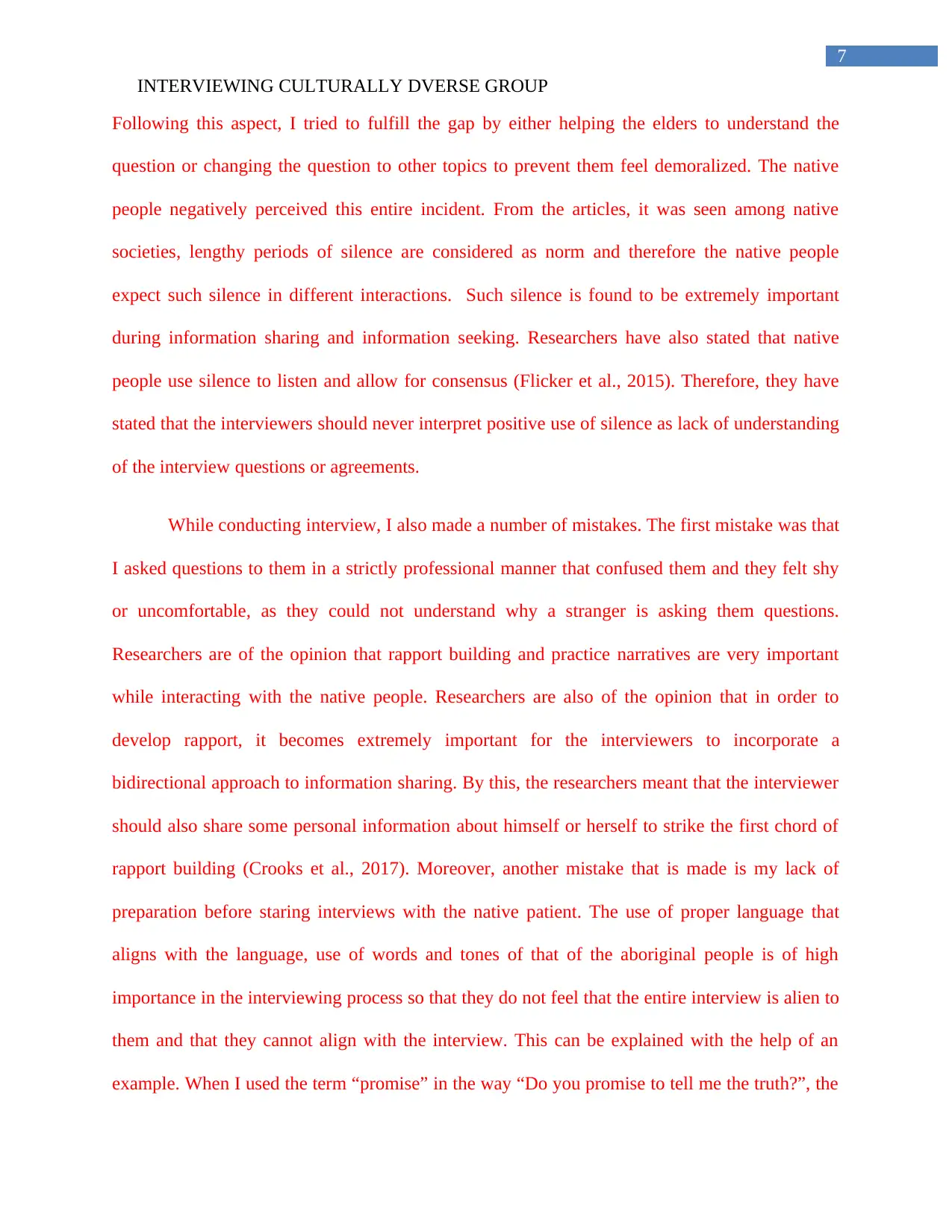
7
INTERVIEWING CULTURALLY DVERSE GROUP
Following this aspect, I tried to fulfill the gap by either helping the elders to understand the
question or changing the question to other topics to prevent them feel demoralized. The native
people negatively perceived this entire incident. From the articles, it was seen among native
societies, lengthy periods of silence are considered as norm and therefore the native people
expect such silence in different interactions. Such silence is found to be extremely important
during information sharing and information seeking. Researchers have also stated that native
people use silence to listen and allow for consensus (Flicker et al., 2015). Therefore, they have
stated that the interviewers should never interpret positive use of silence as lack of understanding
of the interview questions or agreements.
While conducting interview, I also made a number of mistakes. The first mistake was that
I asked questions to them in a strictly professional manner that confused them and they felt shy
or uncomfortable, as they could not understand why a stranger is asking them questions.
Researchers are of the opinion that rapport building and practice narratives are very important
while interacting with the native people. Researchers are also of the opinion that in order to
develop rapport, it becomes extremely important for the interviewers to incorporate a
bidirectional approach to information sharing. By this, the researchers meant that the interviewer
should also share some personal information about himself or herself to strike the first chord of
rapport building (Crooks et al., 2017). Moreover, another mistake that is made is my lack of
preparation before staring interviews with the native patient. The use of proper language that
aligns with the language, use of words and tones of that of the aboriginal people is of high
importance in the interviewing process so that they do not feel that the entire interview is alien to
them and that they cannot align with the interview. This can be explained with the help of an
example. When I used the term “promise” in the way “Do you promise to tell me the truth?”, the
INTERVIEWING CULTURALLY DVERSE GROUP
Following this aspect, I tried to fulfill the gap by either helping the elders to understand the
question or changing the question to other topics to prevent them feel demoralized. The native
people negatively perceived this entire incident. From the articles, it was seen among native
societies, lengthy periods of silence are considered as norm and therefore the native people
expect such silence in different interactions. Such silence is found to be extremely important
during information sharing and information seeking. Researchers have also stated that native
people use silence to listen and allow for consensus (Flicker et al., 2015). Therefore, they have
stated that the interviewers should never interpret positive use of silence as lack of understanding
of the interview questions or agreements.
While conducting interview, I also made a number of mistakes. The first mistake was that
I asked questions to them in a strictly professional manner that confused them and they felt shy
or uncomfortable, as they could not understand why a stranger is asking them questions.
Researchers are of the opinion that rapport building and practice narratives are very important
while interacting with the native people. Researchers are also of the opinion that in order to
develop rapport, it becomes extremely important for the interviewers to incorporate a
bidirectional approach to information sharing. By this, the researchers meant that the interviewer
should also share some personal information about himself or herself to strike the first chord of
rapport building (Crooks et al., 2017). Moreover, another mistake that is made is my lack of
preparation before staring interviews with the native patient. The use of proper language that
aligns with the language, use of words and tones of that of the aboriginal people is of high
importance in the interviewing process so that they do not feel that the entire interview is alien to
them and that they cannot align with the interview. This can be explained with the help of an
example. When I used the term “promise” in the way “Do you promise to tell me the truth?”, the
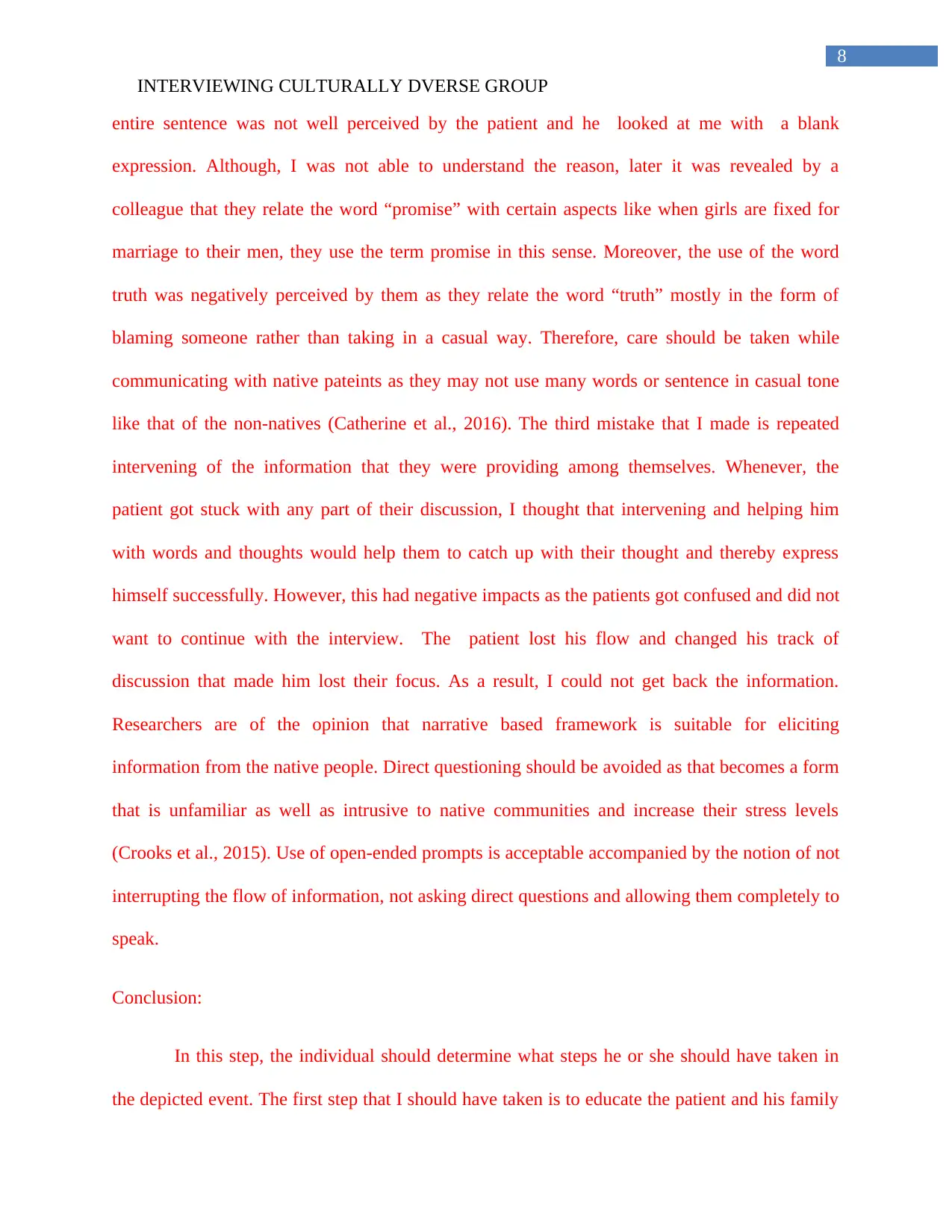
8
INTERVIEWING CULTURALLY DVERSE GROUP
entire sentence was not well perceived by the patient and he looked at me with a blank
expression. Although, I was not able to understand the reason, later it was revealed by a
colleague that they relate the word “promise” with certain aspects like when girls are fixed for
marriage to their men, they use the term promise in this sense. Moreover, the use of the word
truth was negatively perceived by them as they relate the word “truth” mostly in the form of
blaming someone rather than taking in a casual way. Therefore, care should be taken while
communicating with native pateints as they may not use many words or sentence in casual tone
like that of the non-natives (Catherine et al., 2016). The third mistake that I made is repeated
intervening of the information that they were providing among themselves. Whenever, the
patient got stuck with any part of their discussion, I thought that intervening and helping him
with words and thoughts would help them to catch up with their thought and thereby express
himself successfully. However, this had negative impacts as the patients got confused and did not
want to continue with the interview. The patient lost his flow and changed his track of
discussion that made him lost their focus. As a result, I could not get back the information.
Researchers are of the opinion that narrative based framework is suitable for eliciting
information from the native people. Direct questioning should be avoided as that becomes a form
that is unfamiliar as well as intrusive to native communities and increase their stress levels
(Crooks et al., 2015). Use of open-ended prompts is acceptable accompanied by the notion of not
interrupting the flow of information, not asking direct questions and allowing them completely to
speak.
Conclusion:
In this step, the individual should determine what steps he or she should have taken in
the depicted event. The first step that I should have taken is to educate the patient and his family
INTERVIEWING CULTURALLY DVERSE GROUP
entire sentence was not well perceived by the patient and he looked at me with a blank
expression. Although, I was not able to understand the reason, later it was revealed by a
colleague that they relate the word “promise” with certain aspects like when girls are fixed for
marriage to their men, they use the term promise in this sense. Moreover, the use of the word
truth was negatively perceived by them as they relate the word “truth” mostly in the form of
blaming someone rather than taking in a casual way. Therefore, care should be taken while
communicating with native pateints as they may not use many words or sentence in casual tone
like that of the non-natives (Catherine et al., 2016). The third mistake that I made is repeated
intervening of the information that they were providing among themselves. Whenever, the
patient got stuck with any part of their discussion, I thought that intervening and helping him
with words and thoughts would help them to catch up with their thought and thereby express
himself successfully. However, this had negative impacts as the patients got confused and did not
want to continue with the interview. The patient lost his flow and changed his track of
discussion that made him lost their focus. As a result, I could not get back the information.
Researchers are of the opinion that narrative based framework is suitable for eliciting
information from the native people. Direct questioning should be avoided as that becomes a form
that is unfamiliar as well as intrusive to native communities and increase their stress levels
(Crooks et al., 2015). Use of open-ended prompts is acceptable accompanied by the notion of not
interrupting the flow of information, not asking direct questions and allowing them completely to
speak.
Conclusion:
In this step, the individual should determine what steps he or she should have taken in
the depicted event. The first step that I should have taken is to educate the patient and his family
⊘ This is a preview!⊘
Do you want full access?
Subscribe today to unlock all pages.

Trusted by 1+ million students worldwide
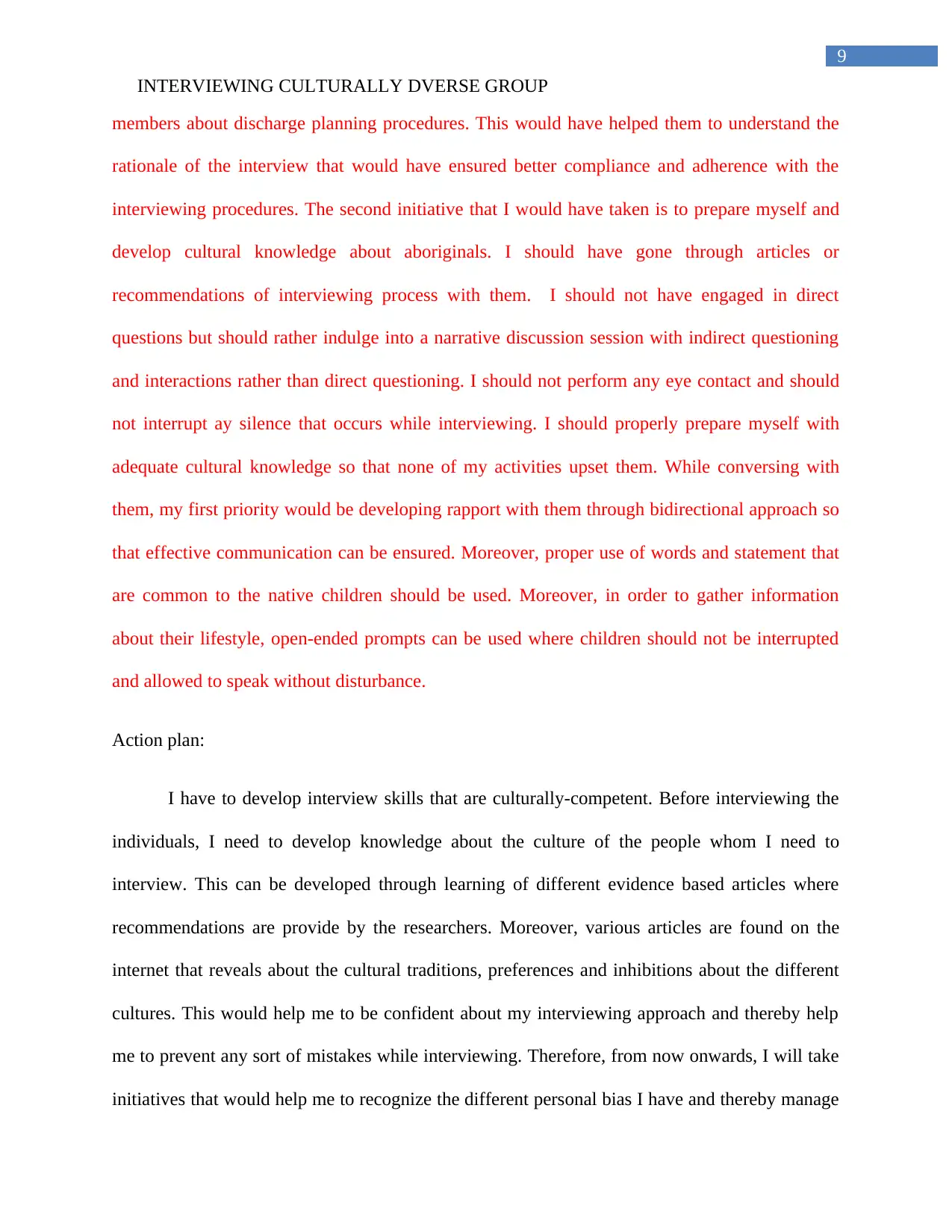
9
INTERVIEWING CULTURALLY DVERSE GROUP
members about discharge planning procedures. This would have helped them to understand the
rationale of the interview that would have ensured better compliance and adherence with the
interviewing procedures. The second initiative that I would have taken is to prepare myself and
develop cultural knowledge about aboriginals. I should have gone through articles or
recommendations of interviewing process with them. I should not have engaged in direct
questions but should rather indulge into a narrative discussion session with indirect questioning
and interactions rather than direct questioning. I should not perform any eye contact and should
not interrupt ay silence that occurs while interviewing. I should properly prepare myself with
adequate cultural knowledge so that none of my activities upset them. While conversing with
them, my first priority would be developing rapport with them through bidirectional approach so
that effective communication can be ensured. Moreover, proper use of words and statement that
are common to the native children should be used. Moreover, in order to gather information
about their lifestyle, open-ended prompts can be used where children should not be interrupted
and allowed to speak without disturbance.
Action plan:
I have to develop interview skills that are culturally-competent. Before interviewing the
individuals, I need to develop knowledge about the culture of the people whom I need to
interview. This can be developed through learning of different evidence based articles where
recommendations are provide by the researchers. Moreover, various articles are found on the
internet that reveals about the cultural traditions, preferences and inhibitions about the different
cultures. This would help me to be confident about my interviewing approach and thereby help
me to prevent any sort of mistakes while interviewing. Therefore, from now onwards, I will take
initiatives that would help me to recognize the different personal bias I have and thereby manage
INTERVIEWING CULTURALLY DVERSE GROUP
members about discharge planning procedures. This would have helped them to understand the
rationale of the interview that would have ensured better compliance and adherence with the
interviewing procedures. The second initiative that I would have taken is to prepare myself and
develop cultural knowledge about aboriginals. I should have gone through articles or
recommendations of interviewing process with them. I should not have engaged in direct
questions but should rather indulge into a narrative discussion session with indirect questioning
and interactions rather than direct questioning. I should not perform any eye contact and should
not interrupt ay silence that occurs while interviewing. I should properly prepare myself with
adequate cultural knowledge so that none of my activities upset them. While conversing with
them, my first priority would be developing rapport with them through bidirectional approach so
that effective communication can be ensured. Moreover, proper use of words and statement that
are common to the native children should be used. Moreover, in order to gather information
about their lifestyle, open-ended prompts can be used where children should not be interrupted
and allowed to speak without disturbance.
Action plan:
I have to develop interview skills that are culturally-competent. Before interviewing the
individuals, I need to develop knowledge about the culture of the people whom I need to
interview. This can be developed through learning of different evidence based articles where
recommendations are provide by the researchers. Moreover, various articles are found on the
internet that reveals about the cultural traditions, preferences and inhibitions about the different
cultures. This would help me to be confident about my interviewing approach and thereby help
me to prevent any sort of mistakes while interviewing. Therefore, from now onwards, I will take
initiatives that would help me to recognize the different personal bias I have and thereby manage
Paraphrase This Document
Need a fresh take? Get an instant paraphrase of this document with our AI Paraphraser
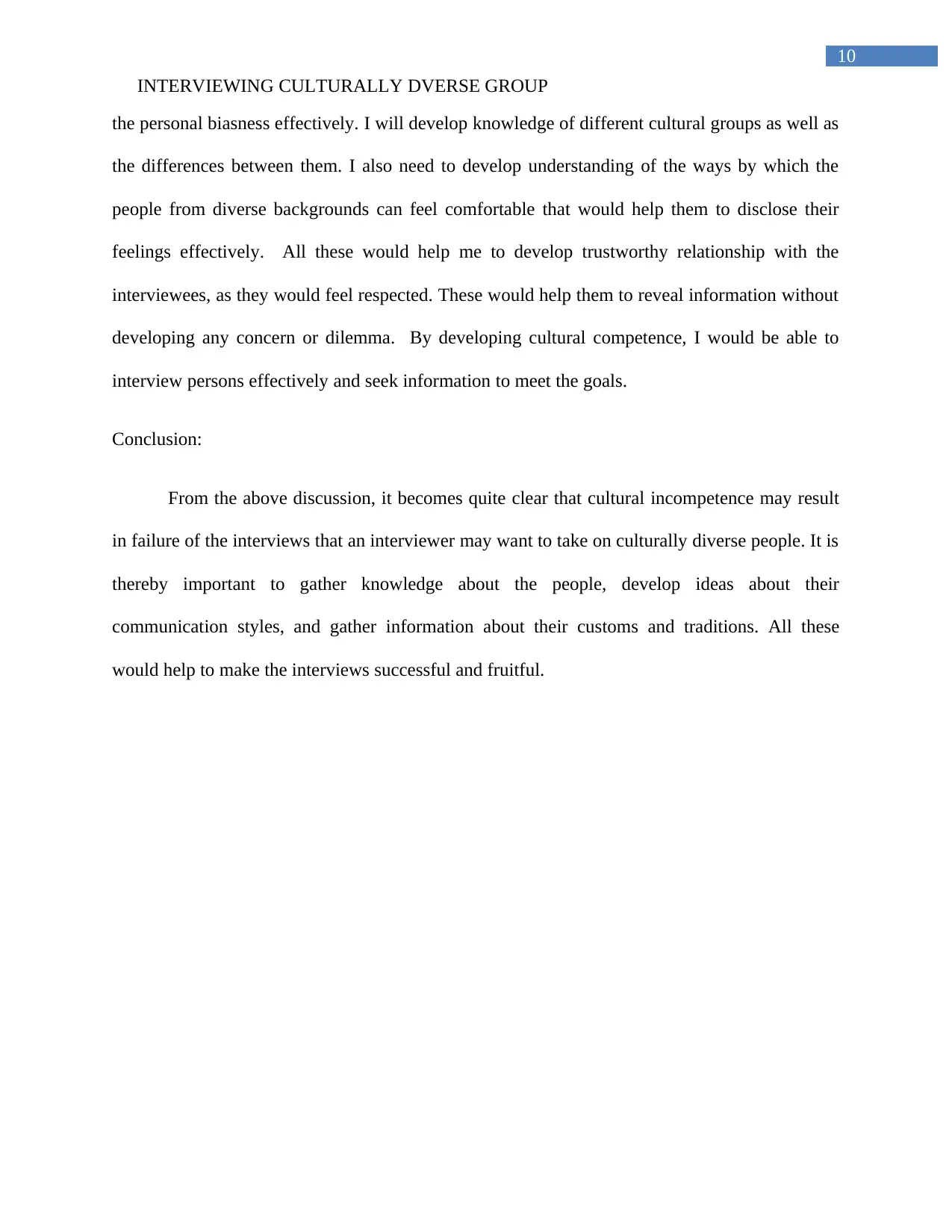
10
INTERVIEWING CULTURALLY DVERSE GROUP
the personal biasness effectively. I will develop knowledge of different cultural groups as well as
the differences between them. I also need to develop understanding of the ways by which the
people from diverse backgrounds can feel comfortable that would help them to disclose their
feelings effectively. All these would help me to develop trustworthy relationship with the
interviewees, as they would feel respected. These would help them to reveal information without
developing any concern or dilemma. By developing cultural competence, I would be able to
interview persons effectively and seek information to meet the goals.
Conclusion:
From the above discussion, it becomes quite clear that cultural incompetence may result
in failure of the interviews that an interviewer may want to take on culturally diverse people. It is
thereby important to gather knowledge about the people, develop ideas about their
communication styles, and gather information about their customs and traditions. All these
would help to make the interviews successful and fruitful.
INTERVIEWING CULTURALLY DVERSE GROUP
the personal biasness effectively. I will develop knowledge of different cultural groups as well as
the differences between them. I also need to develop understanding of the ways by which the
people from diverse backgrounds can feel comfortable that would help them to disclose their
feelings effectively. All these would help me to develop trustworthy relationship with the
interviewees, as they would feel respected. These would help them to reveal information without
developing any concern or dilemma. By developing cultural competence, I would be able to
interview persons effectively and seek information to meet the goals.
Conclusion:
From the above discussion, it becomes quite clear that cultural incompetence may result
in failure of the interviews that an interviewer may want to take on culturally diverse people. It is
thereby important to gather knowledge about the people, develop ideas about their
communication styles, and gather information about their customs and traditions. All these
would help to make the interviews successful and fruitful.
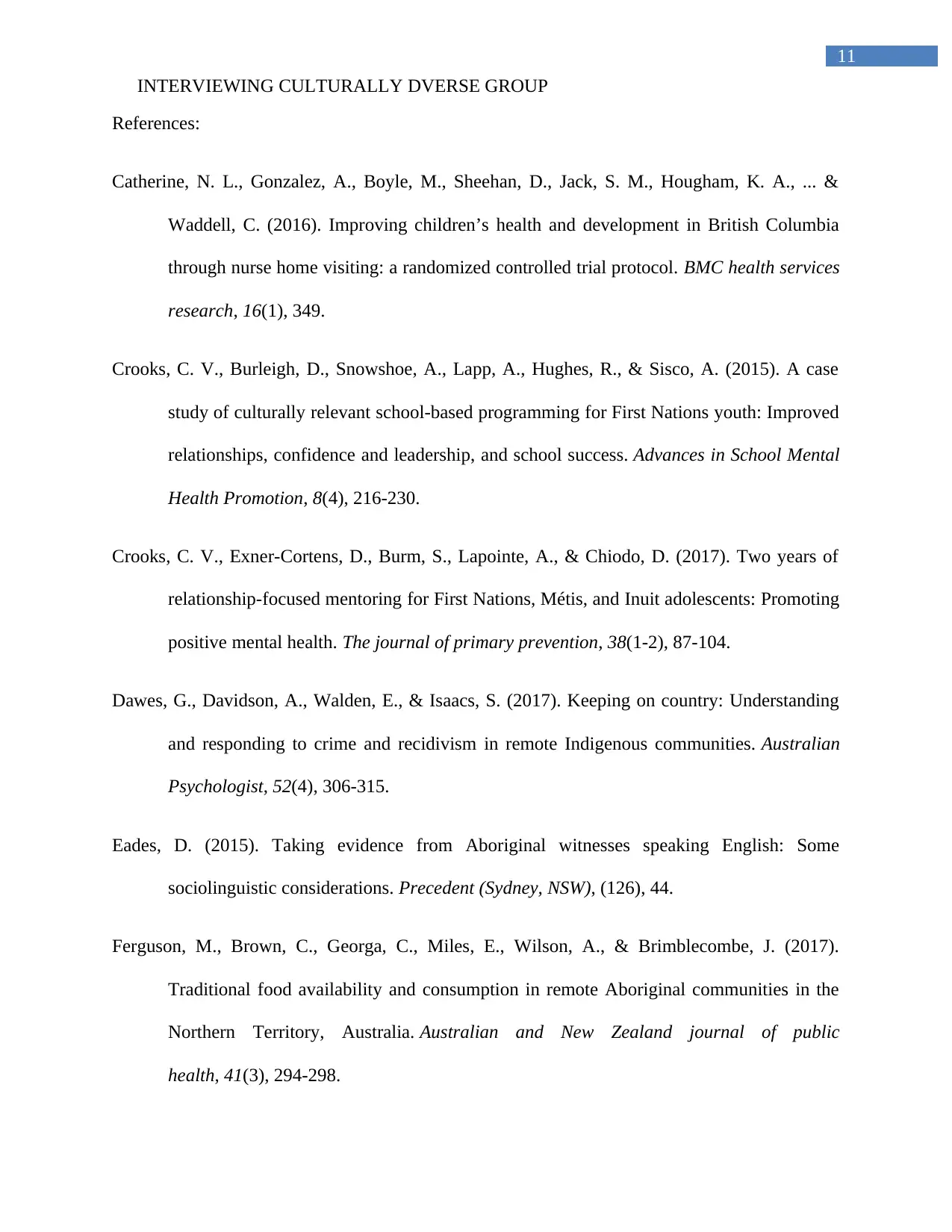
11
INTERVIEWING CULTURALLY DVERSE GROUP
References:
Catherine, N. L., Gonzalez, A., Boyle, M., Sheehan, D., Jack, S. M., Hougham, K. A., ... &
Waddell, C. (2016). Improving children’s health and development in British Columbia
through nurse home visiting: a randomized controlled trial protocol. BMC health services
research, 16(1), 349.
Crooks, C. V., Burleigh, D., Snowshoe, A., Lapp, A., Hughes, R., & Sisco, A. (2015). A case
study of culturally relevant school-based programming for First Nations youth: Improved
relationships, confidence and leadership, and school success. Advances in School Mental
Health Promotion, 8(4), 216-230.
Crooks, C. V., Exner-Cortens, D., Burm, S., Lapointe, A., & Chiodo, D. (2017). Two years of
relationship-focused mentoring for First Nations, Métis, and Inuit adolescents: Promoting
positive mental health. The journal of primary prevention, 38(1-2), 87-104.
Dawes, G., Davidson, A., Walden, E., & Isaacs, S. (2017). Keeping on country: Understanding
and responding to crime and recidivism in remote Indigenous communities. Australian
Psychologist, 52(4), 306-315.
Eades, D. (2015). Taking evidence from Aboriginal witnesses speaking English: Some
sociolinguistic considerations. Precedent (Sydney, NSW), (126), 44.
Ferguson, M., Brown, C., Georga, C., Miles, E., Wilson, A., & Brimblecombe, J. (2017).
Traditional food availability and consumption in remote Aboriginal communities in the
Northern Territory, Australia. Australian and New Zealand journal of public
health, 41(3), 294-298.
INTERVIEWING CULTURALLY DVERSE GROUP
References:
Catherine, N. L., Gonzalez, A., Boyle, M., Sheehan, D., Jack, S. M., Hougham, K. A., ... &
Waddell, C. (2016). Improving children’s health and development in British Columbia
through nurse home visiting: a randomized controlled trial protocol. BMC health services
research, 16(1), 349.
Crooks, C. V., Burleigh, D., Snowshoe, A., Lapp, A., Hughes, R., & Sisco, A. (2015). A case
study of culturally relevant school-based programming for First Nations youth: Improved
relationships, confidence and leadership, and school success. Advances in School Mental
Health Promotion, 8(4), 216-230.
Crooks, C. V., Exner-Cortens, D., Burm, S., Lapointe, A., & Chiodo, D. (2017). Two years of
relationship-focused mentoring for First Nations, Métis, and Inuit adolescents: Promoting
positive mental health. The journal of primary prevention, 38(1-2), 87-104.
Dawes, G., Davidson, A., Walden, E., & Isaacs, S. (2017). Keeping on country: Understanding
and responding to crime and recidivism in remote Indigenous communities. Australian
Psychologist, 52(4), 306-315.
Eades, D. (2015). Taking evidence from Aboriginal witnesses speaking English: Some
sociolinguistic considerations. Precedent (Sydney, NSW), (126), 44.
Ferguson, M., Brown, C., Georga, C., Miles, E., Wilson, A., & Brimblecombe, J. (2017).
Traditional food availability and consumption in remote Aboriginal communities in the
Northern Territory, Australia. Australian and New Zealand journal of public
health, 41(3), 294-298.
⊘ This is a preview!⊘
Do you want full access?
Subscribe today to unlock all pages.

Trusted by 1+ million students worldwide
1 out of 14
Related Documents
Your All-in-One AI-Powered Toolkit for Academic Success.
+13062052269
info@desklib.com
Available 24*7 on WhatsApp / Email
![[object Object]](/_next/static/media/star-bottom.7253800d.svg)
Unlock your academic potential
Copyright © 2020–2026 A2Z Services. All Rights Reserved. Developed and managed by ZUCOL.




